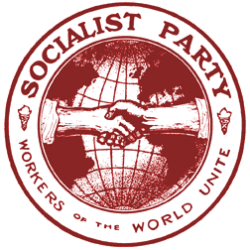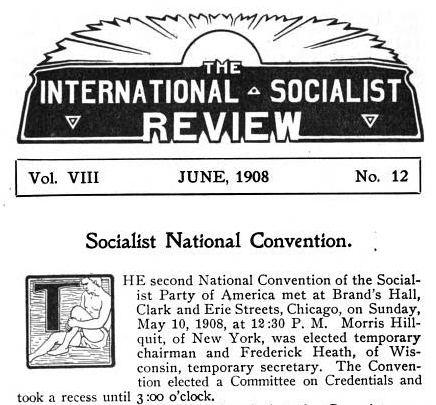
~~~~~~~~~~~~~~~~~~~~~~~~~~~~~~~~~~~~~~~~~~~~
Hellraisers Journal, Tuesday June 9, 1908
Chicago, Illinois – Socialist Party of America Stands with Labor

In this month’s edition of the International Socialist Review, Charles H. Kerr gives a day-by-day account of the national convention of the Socialist Party of America, held in Chicago from May 10th until May 17th. The convention took a strong stand with organized labor, as a whole, while, sadly, side-stepping the issue of Industrial Unionism.
The article by Comrade Kerr was eighteen pages long, from which we offer excerpts below.
From the International Socialist Review of June 1908:
Sunday Session, May 10th:
The Convention opened at 12:30 pm at Brand’s Hall, Chicago. A complete list is given of Delegates representing forty-five states.
Monday Session, May 11th:
A resolution offered by Guy E. Miller of Colorado, to send telegram to Western Federation of Miner, was hotly debated. The Convention voted 93 to 92 to refer that resolution to the Committee on Resolutions.
The remainder of the day was spent on the work of forming the various committees and nominations for same.
Tuesday Session, May 12th:
Committees were finalized; Kerr gives complete lists of committees and members elected to each.
Wednesday Session, May 13th:
Most of day was spent on the report of the Committee on Resolutions, John Spargo, chairman.
The first recommendation of the Convention was that the telegram offered by Guy E. Miller at the Monday session be sent to the Western Federation of Miners. The Convention thereupon decided to send the telegram, the full text of which is as follows:
Ernest Mills, Secretary, Western Federation of Miners,
605 Railroad Bldg., Denver, Colo.The Socialist Party in convention assembled sends greetings to the Western Federation of Miners. We congratulate you upon the splendid battle and final vindication of your organization. We condemn with you the use of federal troops to destroy a labor organization as in Alaska. We are with you until [Steve] Adams and the last of the victims of the Pinkertons are out from the prison pens of poverty into the sunlight of economic freedom.
“Alcoholism Is a Disease.”
The Convention next recommended the adoption of the following resolution on
The Alcohol Question.
We recognize the evils that arise from the manufacture and sale of alcoholic and adulterated liquors and we declare that any excessive use of such liquors by the working class postpones the day of the final triumph of our cause. But we hold that these evils can not be cured by an extension of the police power of the capitalist state. Alcoholism is a disease and can best be remedied by doing away with the under feeding, over-work and over-worry which result from the capitalist system.
This resolution was received with loud applause and adopted unanimously.
Thursday Session, May 14th:
The Committee on Organized Labor Reported and recommended adoption of the Committee’s resolution on “Socialism and Organized Labor,” a long resolution which, boiled down, states plainly:
The Socialist party stands with organized labor in all its struggles to resist capitalist aggression or to wrest from the capitalists any improvement in the conditions of labor.
The Review Supports Delegate Kaplan
Morris Kaplan, of Minnesota, criticised the resolutions on the ground that they did not definitely recognize the principles of Industrial Unionism, and in the midst of a discussion in which many delegates took part, McDevitt, of California, moved as an amendment the insertion of the third paragraph of the following:
But we realize that it is the duty of the Socialist Party to point out to the workers that the industrial form of organization is the best suited to develop the working class solidarity necessary to the success of organized labor under the present methods of production.
The amendment was finally lost and the report of the committee adopted. The only vote on which a division was taken resulted in the committee being sustained by a vote of 143 to 43. The trend of the discussion showed clearly that the object of the committee was to uphold the traditional policy of the Socialist Party in co-operating with all labor organizations without antagonizing any of them. The delegates voting in the minority, (the editor of the Review among them), desired to put the Convention on record as recognizing the fact that industrial unionism is an economic necessity under the changed economic conditions, while the majority of the delegates took the view that any expression of this subject would be an invasion of the sphere of action belonging to the labor organizations rather than the Socialist Party.
The convention voted not to take any steps, at this time, “toward organic unity with the Socialist Labor Party.”
Thursday Evening Session, May 14th:
Debs and Hanford Nominated
An evening session was held. The first two hours were taken up with a discussion of the first part of the Preamble of the National Platform, the full text of which appears else where in this issue of the Review. The Convention then voted to proceed with the nomination of candidates for president and vice-president, and Callery, of Missouri, in a stirring speech placed in nomination the name of Eugene V. Debs. This name was received with tremendous cheers from all parts of the crowded hall. Seymour Stedman nominated A. M. Simons, of Illinois, Victor Berger nominated Carl D. Thompson, of Wisconsin, and Ida Crouch-Hazlet nominated James F. Carey, of Massachusetts. The vote resulted as follows: Debs, 152; Thompson, 16; Carey, 17; Simons, 9. On motion of Victor Berger, the nomination was made unanimous amid great enthusiasm.
The Convention then proceeded to the nomination of a candidate for vice-president, and Guy E. Miller offered the name of Ben. Hanford, of New York, which was received with applause almost equal to that called out by the name of Debs. Several other names were offered to the Convention. The vote was as follows: Ben. Hanford, 106; Seymour Stedman, 43; May Wood Simons, 20; John W. Slayton, 12; Caleb Lipscomb, 1; G. W. Woodbey, 1. On the motion of Seymour Stedman the nomination of Hanford was made unanimous and the Convention adjourned at 2:00 A. M. [May 15th], weary but enthusiastic.
Friday Session, May 15th:
The resolution on Immigration was taken up, which, summed up, states:
Therefore, we recommend that in view of the great importance of this subject to the life of the workers of the nation, a special committee of five members be elected at this convention to carefully study and investigate the whole subject of immigration, in all its aspects, racial no less than economic, to publish from time to time such data as they may gather, and to report to the next convention of the party.
Amendment for Asiatic Exclusion Rejected
After a long discussion a motion to amend the resolution so as to include an explicit declaration against any Asiatic immigration was voted down and the report of the committee was adopted.
The Convention next took up other questions: The Farmers’ Program, The Party Platform, Socialism and Religion, and the Relief of the Unemployed. We refer our readers to Kerr’s article for the discussion on those questions.
Saturday Session, May 16th:
The report of the Committee on Platform was again taken up, and:
The Platform was then adopted as a whole. A committee of three, Berger, Lee and Simons, were elected to revise its literary style before publication. Is is printed in this issue of the Review as revised.
Hellraisers will publish the Platform of the Socialist Party of America at a later date.
The Party Constitution.
The Constitution remains substantially the same. There was, however, one strong point of contention:
An amendment proposed by Ida Crouch-Hazlett of Montana was adopted by the Convention to read as follows:
Any person who opposes political action as a weapon of the working class to aid in its emancipation shall be expelled from the Party.
It is worth while observing that this clause was adopted after a hot debate and represented the emotion of the delegates rather than their judgment.
Sunday Session, May 17th:
The Convention voted to submit the Constitution for approval by membership:
The entire Constitution as adopted by the Convention is to be submitted section by section to a referendum by the membership of the Party and if adopted the new Constitution is to go into effect the first of January 1909.
Woman Suffrage
The Convention next took up the question of Woman Suffrage. A Permanent Committee was elected to further study this question and, also, to study the the work of organization work among women. Members of the committee are: May Wood Simons, Antoinette Konikow, Marguerite Prevey, Winnie Branstetter and Meta Stein.
Convention Adjourns.
Before the motion to adjourn sine die was made, Spargo of New York said:
I suppose we are all agreed that we want to go home. It is well that, having worked hard for eight days, we should end our convention in as good spirit as that with which we began. I am satisfied that when we get back home and have time to forget our tired nerves and have had time to think more calmly of our personal differences here, that each of us will look back to this convention as one of the greatest privileges in each of our lives.
I believe sincerely, and I am not making the conventional statement usual to such occasions, that we shall admit ten years from now that the convention of 1908 practically marked the birth of the Socialist movement as a political party of the working class in this country. I am not going to ask you to listen to any sort of an address now, but I ask you, comrades to rise and join in three cheers for Socialism and the Socialist Party.
The convention then adjourned sine die, after three rousing cheers for Socialism.
Charles H. Kerr.
~~~~~~~~~~~~~~~~~~~~~~
SOURCE
The International Socialist Review Volume 8
(Chicago, Illinois)
Charles H. Kerr & Company
July 1907-June 1908
https://books.google.com/books?id=91dIAAAAYAAJ
ISR of June 1908
https://play.google.com/books/reader?id=91dIAAAAYAAJ&printsec=frontcover&pg=GBS.PA721
IMAGE
SPA Chicago Convention May 10, ISR, June 1908
https://play.google.com/books/reader?id=91dIAAAAYAAJ&printsec=frontcover&pg=GBS.PA721
Socialist Party of America Button
https://www.marxists.org/history/usa/eam/spa/socialistparty.html
See also:
Proceedings: National Convention of Socialist Party
Chicago May 10-17, 1908
https://babel.hathitrust.org/cgi/pt?id=wu.89073013468;view=2up;seq=12
~~~~~~~~~~~~~~~~~~~~~~~~~~~~~~~~~~~~~~~~~~~~

